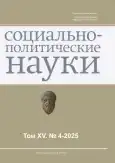Роль политического сознания в построении России как страны-цивилизации
- Авторы: Булавина М.А.1, Легошин А.И.1
-
Учреждения:
- Университет мировых цивилизаций имени В.В. Жириновского
- Выпуск: Том 15, № 4 (2025)
- Страницы: 88-96
- Раздел: Политические институты, процессы и технологии
- URL: https://journals.eco-vector.com/2223-0092/article/view/693230
- DOI: https://doi.org/10.33693/2223-0092-2025-15-4-88-96
- EDN: https://elibrary.ru/WSSJUB
- ID: 693230
Цитировать
Полный текст
Аннотация
В данной статье рассматривается значимость изучения политического сознания как феномена, способного стать основанием для развития и построения России как страны цивилизации. В статье приводится информация о наработках отечественных ученых, внесших вклад в изучение политического сознания. Важной составляющей статьи является подчеркивание того факта, что, отталкиваясь от проводимой работы с населением, существовавшей во времена СССР, в частности, от наработок, позволявших сплотить не только отдельные категории населения, но и все общество в целом, ученые и политические деятели могут интегрировать определенные элементы социального управления прошлой эпохи для интеграции их в современные реалии. В статье отдельное внимание уделяется важности формирования политического сознания с учетом того, что геополитические изменения, происходящие в современном мире, могут вызывать социальные потрясения, которые могут быть нивелированы посредством внедрения четко выстроенной системы политического сознания населения, служащей социально-психологическим щитом перед возможными будущими политическими турбулентностями.
Ключевые слова
Полный текст
Об авторах
Мария Александровна Булавина
Университет мировых цивилизаций имени В.В. Жириновского
Автор, ответственный за переписку.
Email: m.a.bulavina@uwc-i.ru
SPIN-код: 2292-4709
кандидат юридических наук, доцент, проректор по научной работе
Россия, г. МоскваАлексей Игоревич Легошин
Университет мировых цивилизаций имени В.В. Жириновского
Email: ringlevit@yandex.ru
SPIN-код: 6958-8807
аспирант
Россия, г. МоскваСписок литературы
- Бергер П., Лукман Т. Социальное конструирование реальности. Трактат по социологии знания. М.: Медиум, 1995. 323 с.
- Булавина М.А., Новосельский С.О. Наука и образование в России и Донбассе: сравнительно-правовой анализ и перспективы сотрудничества // Россия и Донбасс: перспективы сотрудничества и интеграции: матер. междунар. науч.-практ. конф. М., 2022. С. 230–234.
- Булавина М.А., Новосельский С.О. Роль высшего образования в обеспечении национальной безопасности Российской Федерации в условиях кризиса международных отношений // Тенденции развития системы международных отношений и их влияние на управление национальной обороной Российской Федерации. М., 2023. С. 76–83.
- Иванов Д.Ю. Концепты политических картин мира евразийского пространства в коммуникативной практике аналитических центров // Евразийская интеграция: экономика, право, политика. 2023. Т. 17. № 4. С. 121–132.
- Кирсанов К.А. Базовые положения креативно-развивающей образовательной парадигмы // Мир науки. 2016. Т. 4. № 6.
- Кирсанов К.А., Попова С.А. Формирование экономики интеллектуального труда личности через трансформацию современных мировоззренческих доктрин // Россия и мир: развитие цивилизаций. Научное наследие и взгляды В.В. Жириновского на формирующийся миропорядок: матер. XIII междунар. науч.-практ. конф. М., 2023. 403 с.
- Лапкин В.В. Территориальное государство и сложное общество: императив коэволюции в пространстве политики. // Полис. Политические исследования. 2023. № 5. С. 172–191.
- Моторин Д.И. Картины мира больших социальных групп как фактор изменений политических институтов // Политические институты в современном мире: коллапс или перезагрузка?: сб. матер. по итогам Всерос. науч. конф. (С.-Петербург, 12–13 октяб-ря 2023 г.). СПб.: Скифия-принт, 2023. 302 с.
- Мюрберг И.И. Российский цивилизационный проект: политико-идеологический ракурс // Проблемы цивилизационного развития. 2023. Т. 5. № 1. C. 5–27.
- Парсонс Т. О структуре социального действия. М.: Академический проект. 2000. 880 с.
- Пырма Р.В. Теоретические аспекты исследования политических предпочтений российской молодежи // Власть. 2020. № 4. C. 157–162.
- Хабермас Ю. Теория коммуникативной деятельности. В 2 т. / пер. с нем. А.К. Судакова. М.: Весь мир. 2022. 880 с.
- Шестопал Е.Б. Политическая психология. М.: Инфра-М, 2002. 448 с.
- Шмитт К. Понятие политического. СПб.: Наука. 2016. 568 с.
- Шюц А. Избранное: Мир, светящийся смыслом / пер. с нем. и англ. М.: РОССПЭН, 2004. 1056 с.
Дополнительные файлы











